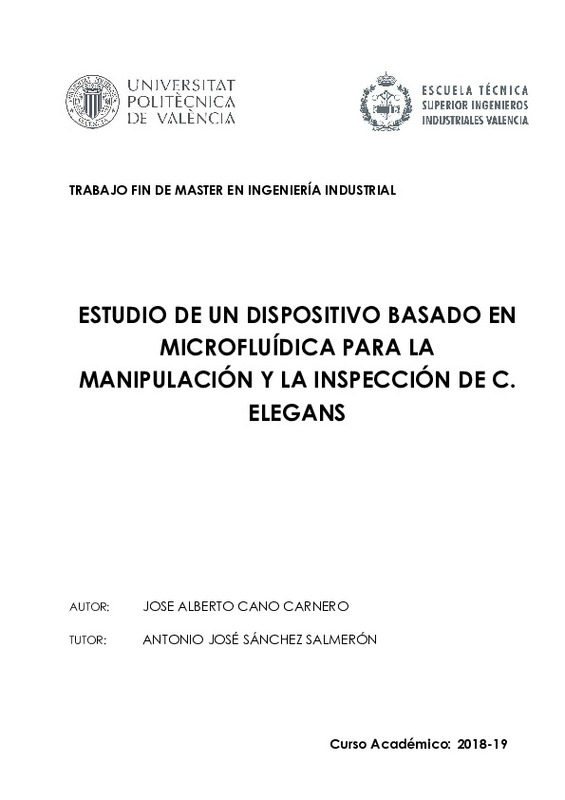|
Resumen:
|
[ES] El presente trabajo final de máster tiene como objetivo el diseño, fabricación y evaluación de un dispositivo para la clasificación de C. elegans. Para ello se aborda el concepto de microfluídica, el cual es necesario ...[+]
[ES] El presente trabajo final de máster tiene como objetivo el diseño, fabricación y evaluación de un dispositivo para la clasificación de C. elegans. Para ello se aborda el concepto de microfluídica, el cual es necesario para llevar a cabo la clasificación mediante microcanales. Dichos dispositivos conocidos como lab on a chip (LOC), integran varias funciones en un espacio muy pequeño, y su uso cada vez es más extendido en campos tales como el estudio y manipulación de células o ADN, debido al gran número de ventajas que proporcionan como la facilidad de uso y manipulación, además de permitir análisis más rápidos, logrando avances los cuales no hubieran sido posibles sin la ayuda de estos dispositivos y la microfluídica.Se parte desde un estudio inicial de las diferentes opciones existentes, y en base a ello se han propuesto diferentes soluciones. Dichas soluciones se han evaluado tanto en simulación como en prueba experimental con el fin de verificar su correcto funcionamiento y si cumplen con los objetivos establecidos. El estudio se ha realizado con herramientas de simulación como por ejemplo Ansys. A parte del diseño, dicho proyecto también aborda la fabricación y puesta en funcionamiento de un dispositivo, seleccionando los sistemas de bombeo necesarios para su funcionamiento. Finalmente han analizado los diferentes resultados obtenidos.
[-]
[EN] The objective of the present final work is the design, manufacture and evaluation of a device for the classification of C. elegans. For this purpose, the concept of microfluidics is addressed, which is necessary to ...[+]
[EN] The objective of the present final work is the design, manufacture and evaluation of a device for the classification of C. elegans. For this purpose, the concept of microfluidics is addressed, which is necessary to carry out the classification by means of microchannels. These devices known as lab on a chip (LOC), integrate several functions in a very small space, and its use is increasingly widespread in fields such as the study and manipulation of cells or DNA, due to the large number of advantages they provide such as the ease of use and manipulation. In addition they allow faster analysis, achieving advances which would not have been possible without the help of these devices and the microfluidic.
The starting point is an initial study of the different existing options, and based on this different solutions have been proposed. These solutions have been evaluated both in simulation and in experimental testing in order to evaluate their correct operation and whether they meet the established objectives. The study was carried out using simulation tools such as Ansys. Apart from the design, this project also deals with the manufacture and commissioning of the device, selecting the pumping systems necessary for its operation. Finally, the different results have been analysed.
[-]
|







